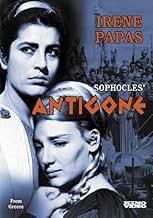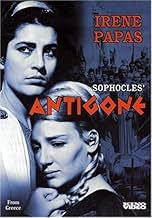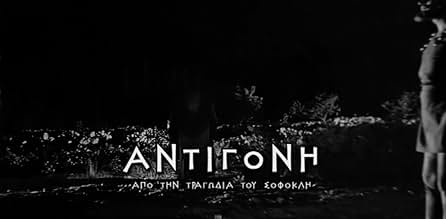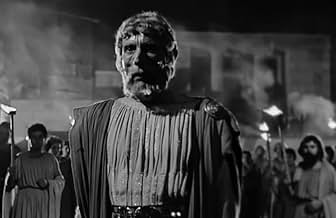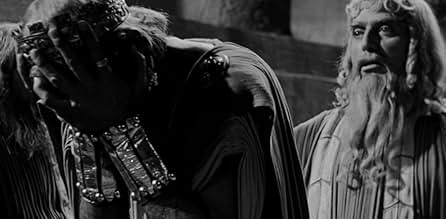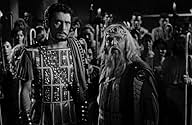NOTE IMDb
7,1/10
954
MA NOTE
Ajouter une intrigue dans votre langueAntigone defies her uncle's decree that her traitorous brother should go unburied and therefore find no rest in the afterlife; however, her actions have tragic consequences.Antigone defies her uncle's decree that her traitorous brother should go unburied and therefore find no rest in the afterlife; however, her actions have tragic consequences.Antigone defies her uncle's decree that her traitorous brother should go unburied and therefore find no rest in the afterlife; however, her actions have tragic consequences.
- Réalisation
- Scénario
- Casting principal
- Récompenses
- 3 victoires et 1 nomination au total
Yorgos Karetas
- Elder of Thebes
- (as Giorgos Karetas)
Mimis Rougeris
- Elder of Thebes
- (as Dimitris Rougeris)
Avis à la une
...Or, Two Rights Make A Wrong. Over the years I've seen many versions of Antigone, both films and TV and even read two translations of the timeless tale by Sophocles but I was mainly interested in seeing this one as I've never heard it spoken in Greek before. Can't understand a word; whether it makes it more authentic or not is debatable - and after digesting all the concepts in the play whether you need another idea to debate is also debatable – but it certainly adds another dimension.
Strong minded woman Antigone wants to bury her brother Polyneices returned from exile who kills but is killed in battle by her other brother Eteocles who is feted as Thebes' saviour and given a hero's burial. Wilful King Creon decrees death to anyone honourably burying the traitor Polyneices bringing calamity and endless moral dilemmas for all concerned. Antigone is excellently played by Irene Papas, fresh from The Guns of Navarone the year before. This is Sophocles whizzed through in eighty minutes, concentrating on this wilfulness, pride and refusal to listen either to their gods, counsel or commonsense. It's been a salutary lesson for all people but especially despots and politicians of all eras; some wilfully blind leaders lead nations to war and destruction with their gods on their side and in the aftermath justify themselves even if it means black must be white and vv too of course. The ever modern tragedies are that the despots and politicians never heed the lessons in here though and indeed that ordinary people still desire shepherds to lead them. Without going into any of the moral and ethical points raised (plenty mentioned in other comments here) as a film it's a reasonable effort and well acted and engrossing enough although I'd always imagined Thebes to be a little grander somehow. If you're still unsure: memorable, lots to chew over but absolutely no laughs.
Strong minded woman Antigone wants to bury her brother Polyneices returned from exile who kills but is killed in battle by her other brother Eteocles who is feted as Thebes' saviour and given a hero's burial. Wilful King Creon decrees death to anyone honourably burying the traitor Polyneices bringing calamity and endless moral dilemmas for all concerned. Antigone is excellently played by Irene Papas, fresh from The Guns of Navarone the year before. This is Sophocles whizzed through in eighty minutes, concentrating on this wilfulness, pride and refusal to listen either to their gods, counsel or commonsense. It's been a salutary lesson for all people but especially despots and politicians of all eras; some wilfully blind leaders lead nations to war and destruction with their gods on their side and in the aftermath justify themselves even if it means black must be white and vv too of course. The ever modern tragedies are that the despots and politicians never heed the lessons in here though and indeed that ordinary people still desire shepherds to lead them. Without going into any of the moral and ethical points raised (plenty mentioned in other comments here) as a film it's a reasonable effort and well acted and engrossing enough although I'd always imagined Thebes to be a little grander somehow. If you're still unsure: memorable, lots to chew over but absolutely no laughs.
Antigone represents the epitome of philosophical thought in antiquity. The ruler in Creon is set opposite to the loyal sister in Antigone. The ethical dilemma presented in the film is much like Plato's works: Euthyphro and Republic. Creon, as the ruler Thebes, thinks it just to not bury the fallen enemies near the city as it would disgrace the city. Antigone on the other hand feels it just to her fallen brother, a confederate to the previous regime, that he be given a proper burial in regard to his and Antigone's beliefs in the Gods.
The conflict gets its genesis from a varying view of what is just or the right thing to do. Take Plato's dialogue between Socrates and Euthyphro in Euthyphro. Euthyphro explains to Socrates that something pious (just, good) is something unanimously loved by the Gods. Socrates raises the question as to whether the gods love the pious because it is the pious or whether something pious is only pious because it is loved by the gods. The circular dilemma present by Euthyphro brings a question to Antigone. Is she right for wanting her brother buried and disrupting edicts by Creon's rule? Is her pious belief in the Gods something she ought to uphold? Does the good or justice in her brother's burial supersede Creon's rule? Additionally, in Plato's Republic Thraseymachus explains to Socrates that the just is the advantage of the stronger, and that it is just to obey one's rulers. Socrates argues against this conclusion but with weak premises. For Euthyphro, Antigone would be justified in wanting her brother buried in his religious fashion which would dictate his corpse not rotting in the woods. Thraseymachus on the other hand would say that the justice resides in the ruler, Creon, for better or worse. Which is right?
The conflict gets its genesis from a varying view of what is just or the right thing to do. Take Plato's dialogue between Socrates and Euthyphro in Euthyphro. Euthyphro explains to Socrates that something pious (just, good) is something unanimously loved by the Gods. Socrates raises the question as to whether the gods love the pious because it is the pious or whether something pious is only pious because it is loved by the gods. The circular dilemma present by Euthyphro brings a question to Antigone. Is she right for wanting her brother buried and disrupting edicts by Creon's rule? Is her pious belief in the Gods something she ought to uphold? Does the good or justice in her brother's burial supersede Creon's rule? Additionally, in Plato's Republic Thraseymachus explains to Socrates that the just is the advantage of the stronger, and that it is just to obey one's rulers. Socrates argues against this conclusion but with weak premises. For Euthyphro, Antigone would be justified in wanting her brother buried in his religious fashion which would dictate his corpse not rotting in the woods. Thraseymachus on the other hand would say that the justice resides in the ruler, Creon, for better or worse. Which is right?
This film, seen in my youth, has etched itself indelibly into my psyche. Achingly bleak, this story of a sister's love is portrayed in a classical style, with Irene Pappas powerfully projecting the character of the title role. This is a worthwhile way to use your valuable time.
It is true the more knowledge of the play by Sophocles and of Greek plays, in general, the more you can appreciate this rendition. However, the interesting thing about this presentation is you can start from ground zero and come away with everything the tragedy is about. Even though the story is well known, I will not go through it in case this is your first time.
There is an introduction to bring you up to date from Oedipus through his descendants and history to today where you meet Antigone and her sister Ismene. Their decisions are partially ordained and those of the new king Creon decide the outcome. You may find yourself quoting this play as you would Shakespeare's plays.
The reason for watching it multiple times is the first time around you may be busy reading the subtitles of which some flash and are gone. The second time around you may keep an eye on the acting. Third, you will get used to the Greek and even if you do not speak it, you will find much filled in that was not subtitled. By now you will be hooked and have to watch it periodically.
There is an introduction to bring you up to date from Oedipus through his descendants and history to today where you meet Antigone and her sister Ismene. Their decisions are partially ordained and those of the new king Creon decide the outcome. You may find yourself quoting this play as you would Shakespeare's plays.
The reason for watching it multiple times is the first time around you may be busy reading the subtitles of which some flash and are gone. The second time around you may keep an eye on the acting. Third, you will get used to the Greek and even if you do not speak it, you will find much filled in that was not subtitled. By now you will be hooked and have to watch it periodically.
In Thebes in ancient Greece, King Oedipus kills his father and marries his mother Jocasta, having two sons – Eteocles and Polyneices – and two daughters – Ismene and Antigone. King Oedipus dies a beggar in the exile after gouging out his own eye, and Eteocle agrees to reign in Thebes in alternating years with Polynices. However, he refuses to resign after the first year and Polynieces raises an army and attacks Thebes, and they kill each other.
The ruler of Thebes Creon (Manos Katrakis) decrees that Eleocles should have an honorable burial while the body of the traitor Polyneices should be left on the battlefield to be eaten by the jackals and vultures. However, Antigone (Irene Papas), who was betrothed to Creon's surviving son Haemon (Nikos Kazis), defies Creon's orders and buries her brother. When Creon is reported of the attitude of Antigone, he sentences her to be placed in a tomb alive. Antigone hangs herself in the tomb and Haemon tries to kill his father first and then he kills himself with his sword. When Creon's wife Eurydice (Ilia Livykou) is informed of the death of her son, she also commits suicide, leaving Creon alone.
The theatrical "Antigoni" is a nice feature about the famous Greek tragedy of Sophocles focused in Antigone, the incestuous daughter of Oedipus and therefore also his half-sister and Jocasta's granddaughter. The movie begins with an important big picture of Thebes and the major characters of that period, and is extremely well acted. This is the first time that I watch this movie and I saw it in an American VHS. I only regret the quality of the subtitles that are visibly too much summarized since there are long speeches of characters that are translated in two or three words in English. My vote is eight.
Title (Brazil): Not Available
The ruler of Thebes Creon (Manos Katrakis) decrees that Eleocles should have an honorable burial while the body of the traitor Polyneices should be left on the battlefield to be eaten by the jackals and vultures. However, Antigone (Irene Papas), who was betrothed to Creon's surviving son Haemon (Nikos Kazis), defies Creon's orders and buries her brother. When Creon is reported of the attitude of Antigone, he sentences her to be placed in a tomb alive. Antigone hangs herself in the tomb and Haemon tries to kill his father first and then he kills himself with his sword. When Creon's wife Eurydice (Ilia Livykou) is informed of the death of her son, she also commits suicide, leaving Creon alone.
The theatrical "Antigoni" is a nice feature about the famous Greek tragedy of Sophocles focused in Antigone, the incestuous daughter of Oedipus and therefore also his half-sister and Jocasta's granddaughter. The movie begins with an important big picture of Thebes and the major characters of that period, and is extremely well acted. This is the first time that I watch this movie and I saw it in an American VHS. I only regret the quality of the subtitles that are visibly too much summarized since there are long speeches of characters that are translated in two or three words in English. My vote is eight.
Title (Brazil): Not Available
Le saviez-vous
- AnecdotesThe movie sold 43,705 tickets. It came in 12th out of 68 movies.
- ConnexionsReferenced in Dinos Katsouridis: Mia zoi san sinema (2012)
Meilleurs choix
Connectez-vous pour évaluer et suivre la liste de favoris afin de recevoir des recommandations personnalisées
- How long is Antigone?Alimenté par Alexa
Détails
- Date de sortie
- Pays d’origine
- Langue
- Aussi connu sous le nom de
- Antigone: A Tragedy by Sophocles
- Lieux de tournage
- Alfa Studios, Athènes, Grèce(Studio)
- Société de production
- Voir plus de crédits d'entreprise sur IMDbPro
- Durée1 heure 33 minutes
- Couleur
- Mixage
- Rapport de forme
- 1.37 : 1
Contribuer à cette page
Suggérer une modification ou ajouter du contenu manquant


